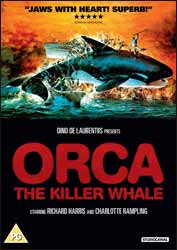|
Click here to return to the main site. DVD Review
Captain Nolan is an Irishman living in Canada. He has inherited his father’s old fishing boat, and is attempting to catch various marine life in a bid to pay off the mortgage on the boat, so that he can return home. Whilst striving to catch a Great White shark, the shark is attacked and killed by a killer whale. Nolan immediately has the notion that an Orca will net him a lot more money. However, he misses the male, instead spearing a female. It is winched on board, badly injured, only for Nolan to discover it is pregnant. The baby is lost, enraging the male so that it attacks the vessel. Nolan orders the female cut loose, but it is fatally hurt. The male sees Nolan on board, and the captain is told by an expert that killer whales are highly vengeful creatures, as they are intelligent and very family-oriented. He learns this first-hand when the whale follows his boat back, and terrorises the fishing port – destroying other boats, and even causing fires. The townsfolk know the only way the attacks will cease is if Nolan leaves. And the bitterly sorry Nolan realises the only way he will get any peace is to put to sea and face the beast in its own territory... To all intents and purposes this is Moby Dick for the 1970s. Not a lot has changed in the telling of this story except, perhaps, less allusions to religion and much more to morality. To be really pedantic here, a killer whale isn’t a whale. It’s basically a dolphin, by which I mean it belongs to the same family group. However, it is the perfect choice for the purposes of this story, because it is the ocean’s biggest killer, thinking nothing of attacking a shark – even a Great White. It is also highly intelligent, and carries certain human traits such as vengeance, and is scheming or calculating in its methods. It has been known to drive prospective prey hundreds of miles away from their comfort zones, and so it’s not too much of a stretch to accept the male in this film luring our more contemporary Captain Ahab into the ice fields for the final confrontation. I did wonder, however, how it managed to blow-up virtually the whole town just by breaking a water pipe in the harbour. The attack might have achieved very little at all, but instead has a domino effect which explodes a refinery. Producer Dino De Laurentis was known for his prolific output of films, rather than their quality, which tended to range between the perfectly sound and the cringe-worthy low budget affair. Perhaps this explains why Orca: The Killer Whale seems like an amalgamation of the two. Without the stellar cast of the time, I rather think this movie would have unfairly been dismissed as below consideration. Shakespearean actor Richard Harris plays Captain Nolan with a briefly selfish but then repenting air. He spends the majority of the film regretting his actions, and it seems pretty early on that he has decided to meet the beast and die. Charlotte Rampling is an unusual actress to watch. She’s like the female version of Roger Moore; whether she’s supposed to be sad, angry, determined or upset, she wears the same expression. Bo Derek, sporting a plaster-cast leg, and then no leg at all (!), works well as the required eye candy. And music from established spaghetti western maestro Ennio Morricone lifts this film into the major release bracket. Nevertheless, it’s one of those films which, even from the start, you watch thinking it’s sort of okay, but nothing special. 5 Ty Power Buy this item online
|
|---|


